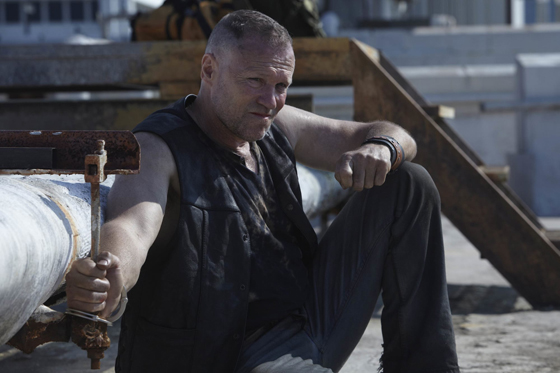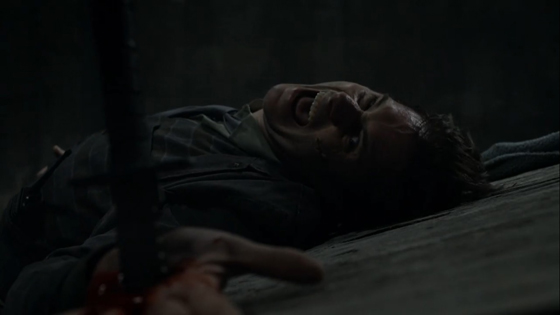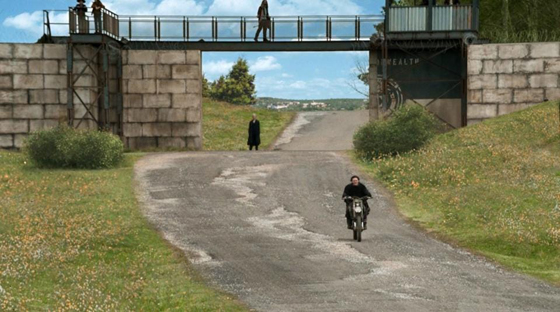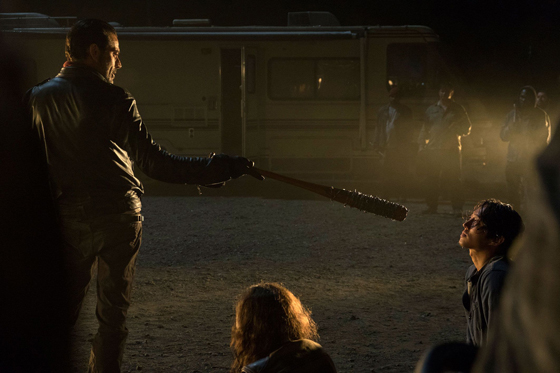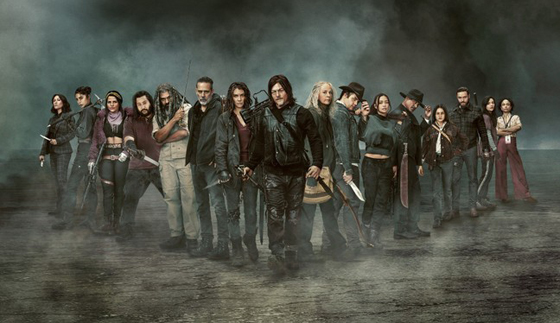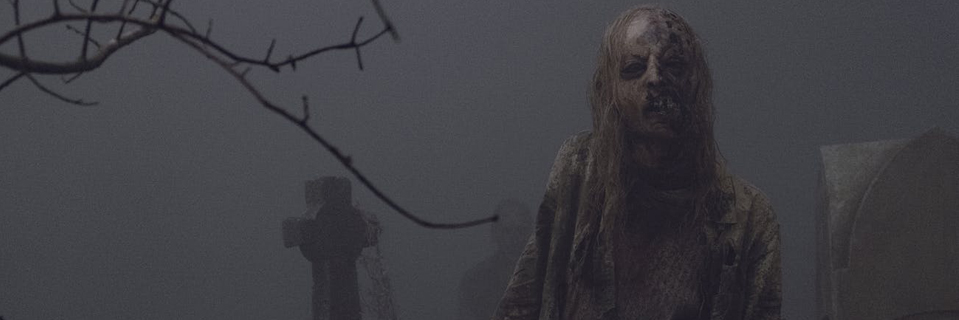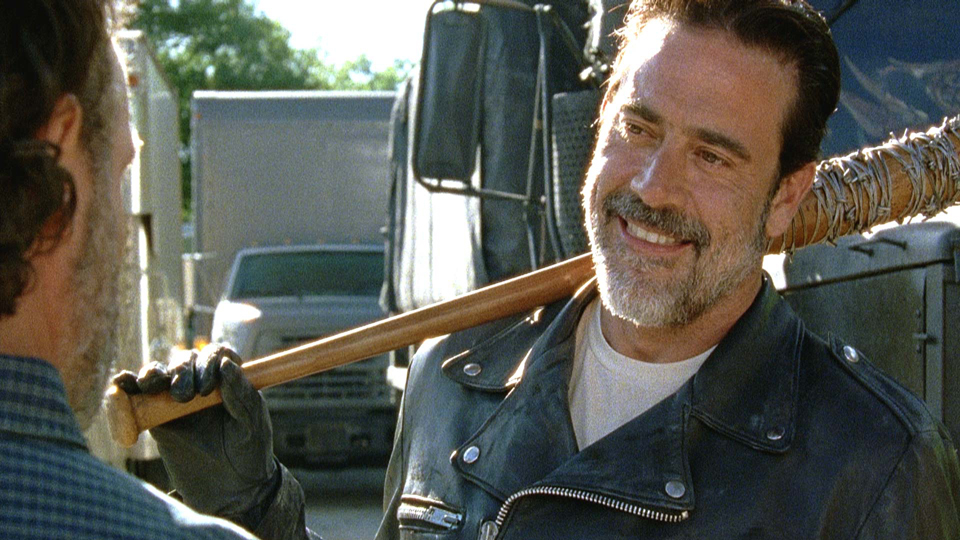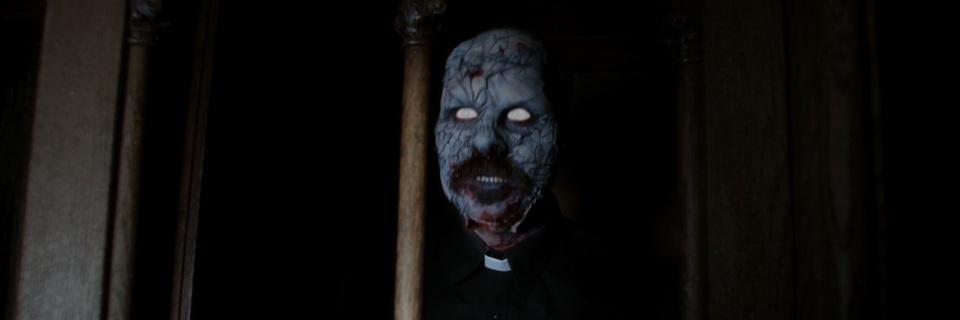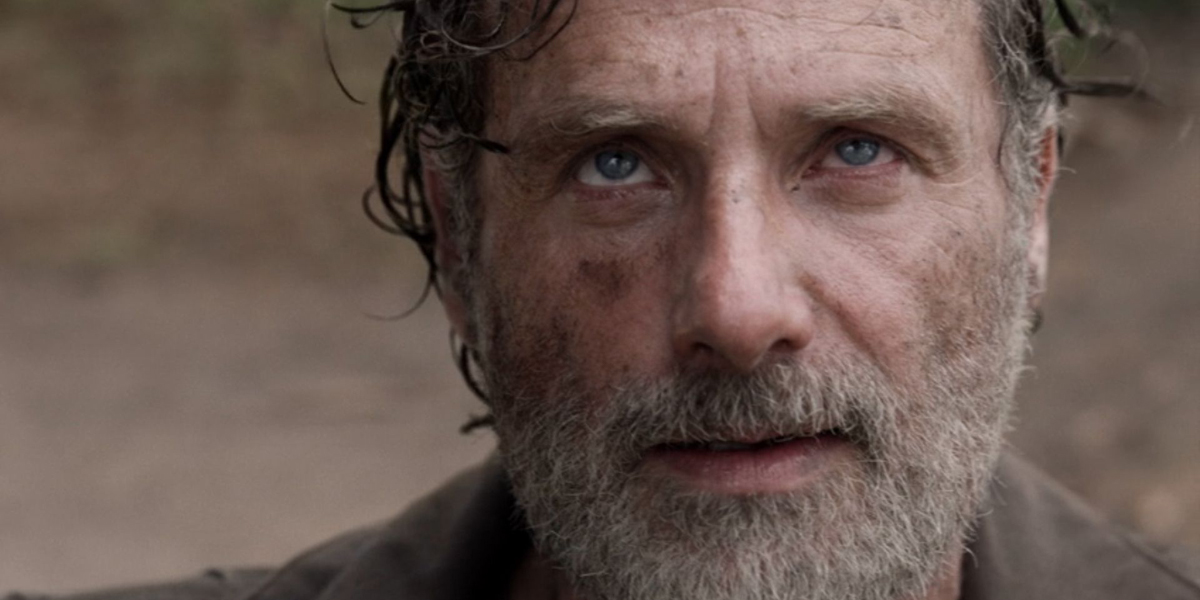
“The Walking Dead is dead; long live The Walking Dead!”
That seems appropriate. I mean, The Walking Dead IS finally over, but with spinoffs and miniseries waiting in the wings, the line of succession to the throne of TV’s most successful stab at horror is clear. So, this universe will soldier on. But this piece of it—the O.G. zombie horror franchise that redefined what genre television could be as it splattered our screens with unprecedented amounts of rotten, bloody viscera and later filled our earholes with gloriously cathartic F-bombs—has finally gotten a machete to the dome.
Living Dead Legacy
The Walking Dead premiered on Halloween night of 2010 on AMC. Almost exactly three weeks later Ravenous Monster lurched forth from the primordial ooze of the world wide web and onto your screens. So, it’s been a while. And although The Walking Dead has had its ups and downs, Ravenous Monster, horror TV, and the genre at large were all shaped to one extent or another by this smash hit series.
The biggest mark The Walking Dead will leave in its wake is the mainstreaming of true, explicit horror to the masses via their television sets. It was a proof-of-concept investment that succeeded to an almost unimaginable extent. As a result, it could be reasonably argued that the small screen is the superior medium to deliver large scale, long scope horror stories.
Look at what’s happened in that realm since the Fall of 2010. We’ve gotten American Horror Story, Ash vs Evil Dead, Chucky, The Terror, Penny Dreadful, Teen Wolf, Scream, Let the Right One In, Interview with a Vampire, Bates Motel, Hannibal, Sleepy Hollow, Stranger Things, The Mist, Mindhunter, Mr. Mercedes, NOS4A2, Castle Rock, What We Do in the Shadows, Lovecraft Country, and of course Fear the Walking Dead, The Walking Dead: World Beyond, and Tales of the Walking Dead. And that’s just a small, random sample of the absolute torrent of horror that’s arrived on our television sets since The Walking Dead premiered. No iconic fright franchise or master horror author’s canon was insulated from getting a small screen adaptation.
And it’s not like any of these series were sanitized for the masses. Many of them arrived by way of streamers like Netflix where anything goes, but even most of the shows on network television delivered gore and disturbing imagery that far surpassed that of even the most notorious golden age slasher flicks. The only thing missing was the gratuitous nudity, but if you’re really feeling that void, you have bigger problems than boob-free TV to worry about.
Not all these series were successful or even good, but when there’s this much material, a few duds are neither unexpected nor all that difficult to forgive. In short, The Walking Dead was the catalyst for the most prolific expansion of horror in the history of moving pictures, and that’s been wonderful, warts and all.
The Walking Dead’s importance to the horror genre is clear. But where does it rank based on its own merits? In other words, was it any good?
Executing the Impossible
Well, that’s not a simple answer. I’m a firm believer that the ideal lifespan for a television series is five seasons. The Wire and Breaking Bad are two obvious examples of the ideal. However, examples of shows that overstayed their welcome are even more prolific.
It seems like anything beyond five years tends to be motivated by a show’s money-making ability/obligations and not by competent, compelling storytelling. Successful series often become industries unto themselves in which too many people’s wallets depend on pushing out content until the wheels fall off, and even then, attempts are made to drag the rusted-out carcass a few more feet come hell or highwater. It’s the enduring tale of Art being usurped by Commerce. Such is the case with The Walking Dead.
The first season was a good if not great look at the potential this adaptation had as a legitimately compelling drama set during the zombie apocalypse. It might not seem like it now, but back in 2010, that description was anathema to a sure thing. Season One was essentially a brief and exciting dip of the toe into the murky waters of modern genre TV.
Beginning in Season Two, The Walking Dead hit its stride as a gory and intense ensemble drama. It went about its business in earnest and quickly became can’t-miss viewing, inducing both gags and gossip on Monday mornings around the water coolers of offices the world over.
Impressively, The Walking Dead maintained an unlikely level of quality into its sixth season. Then came Negan (Jeffrey Dean Morgan). The introduction of this fan favorite bad guy ironically began the show’s descent into a mediocre-at-best morass that eventually saw show runners, major cast members, and even fans jump ship. Remember the five-year rule?
The rise and fall of The Walking Dead is a fascinating artistic and pop cultural story that I’ve had the pleasure to write about at length here over the past decade plus, and I encourage you to go back and take a look at those reviews. But let’s get to the business at hand. What about the end? What about these final eight episodes?
Reviewing THE END
Spoilers ahead!
When we left off, our heroes were hatching a plan to expose the Commonwealth’s dark underbelly and bring its leader Governor Pamela Milton (Laila Robbins) to justice. Governor Milton and the military/police apparatus had been “disappearing” citizens and using them for slave labor as they absorbed smaller communities in an attempt to extend the Commonwealth’s geopolitical reach and power.
As Daryl (Norman Reedus), Maggie (Lauren Cohan), Aaron (Ross Marquand) and Gabriel (Seth Gilliam) met with Negan to come up with a battleplan against the Commonwealth forces, Deputy Governor Lance Hornsby (Lance Hamilton) giddily watched over his troops as they hung Commonwealth banners from the entrances to Hilltop, Alexandria, and Oceanside.
As Episode 17 begins our heroes are still on the lam from Lance’s troops inside a ghost town. They decide to have Negan infiltrate the Commonwealth as a spy. With Daryl’s help, he takes out a cadre of Lance’s soldiers, steals a vehicle, and heads off to the Commonwealth.
When Negan arrives, he divulges his identity to the head of security and secret rebellion sympathizer Mercer (Michael James Shaw) who reunites him with Carol (Melissa McBride). Because an angry, anti-Milton rebellion is already fomenting, some citizens go after the Governor’s son Sebastian (Teo Rapp-Olsson), who deserves all that smoke, incidentally. Governor Milton reluctantly strikes a deal with Carol to find Sebastian and safely deliver him back to her.
Meanwhile, Daryl and the others take out most of Lance’s soldiers before Daryl takes Lance hostage. Carol, Negan, Mercer, and Governor Milton show up just in time and try to deescalate the standoff. Daryl reluctantly frees Lance but not without a parting gift—a large knife through the hand (which I think is available at Amazon—the Commonwealth of the retail world).
With shifting circumstances, our heroes are forced to adjust tactics. Governor Milton’s assistant Max (Margot Bingham)—whom I should remind you is not only Mercer’s sister, but also a spy for the good guys, the lover of our favorite weird nerd Eugene (Josh McDermitt), and the catalyst for our heroes’ encounter with the Commonwealth in the first place—secretly records Sabastian ranting about the citizens of the Commonwealth and his mother’s true agenda. Max and Eugene plan to play the recording over the PA system during a planned speech by Sabastian at an anniversary celebration for the Commonwealth where most of its citizens are expected to be in attendance.
While the celebration is gearing up, the now incarcerated Lance makes a move from within his cell, having his allies murder two janitors, thus creating a pair of Walkers to roam the streets during the pending revelry. As Sebastian takes the stage, Eugene heads to the sound board and plays the secret recording. Upon hearing the truth, the crowd is incensed while the Walkers shamble among the commotion. Chaos ensues.
Sabastian is livid about Max’s betrayal and attempts to force feed her to one of the Walkers. However, Eugene comes to rescue like a blaze of nerdy lightning, pushing Max out of the way and redirecting the Walker toward Sebastian who’s immediately devoured in front of the simultaneously apathetic and horrified onlookers. Judith (Cailey Fleming) shoots the Walker, but Sabastian dies in horrified agony, anyway. Well-deserved horrified agony, at least.
Governor Milton orders Eugene’s arrest and promises to go easy on Max if Eugene turns himself in. Mercer, caught in the middle and concerned for his sister, searches high and low for Eugene, but once Max is arrested, Eugene turns himself in and claims he acted alone. Eugene is soon found guilty and sentenced to death.
And here we find out something that I’m sure will make the forthcoming spinoffs more interesting: Aaron discovers a variant of Walkers that can climb, open doors, and use tools and weapons…gulp!
Carol and Daryl break Lance out of jail as he’s the only one with knowledge about where to find the Commonwealth’s missing people, including the children. They’re being held in a labor camp called Outpost 22. Some of them, like Connie (Lauren Ridloff) have been separated out and classified as ‘Designation 2’ destined to be shipped far away, never to be seen again. Fortunately, there’s a train for them to follow that transports Designation 2s and supplies. They soon find it, rescue Connie, and learn that Outpost 22 is actually Alexandria. Game on….
Our heroes liberate Alexandria first. Then the rebel forces take the train back to the Commonwealth Capitol where Mercer plans to use testimony from the newly liberated prisoners to remove Governor Milton from power legally and peacefully. However, she catches on and has Mercer arrested. She draws the rebellion in and then orders her remaining loyal troops to direct a giant Walker herd to the city, triggering a lockdown. This proves disastrous when several variant Walkers in the herd are able to enter the city pretty much the way normal living people would: opening doors, climbing over walls, etc.
With a determined coalition of rebels inside the Commonwealth, a citizen uprising sympathetic to the rebels already underway, and advanced Walkers on the loose inside the walls, Governor Milton orders her troops to protect the gated Estates where she lives and abandons her citizens to the death and destruction that’s descended upon their city.
When it’s all said and done, Pamela Milton is arrested for her crimes and the Commonwealth is saved. Some of our beloved heroes don’t make it and some who do are forever scarred, both physically and emotionally. Our survivors will carry on just like they have at the conclusion of every other season of The Walking Dead. Only this time there’s a palpably hopeful epilogue. There’s no immediate threat teed up and ready to cause havoc in a few months. So, I guess we can envision them living out their days happily ever after if we want to.
But wait….
This series HAD a real protagonist. One who went from being a normal guy—a cop with marital struggles trying to raise his son the best he can—to a man thrust into the zombie apocalypse and depended on to lead, to the most bad-assed survivor the new world could possibly conceive, to a broken man, to a redeemed man, and back again. He’s also a protagonist who hasn’t been on the show since Episode 5 of Season Nine. Rick Grimes.
This series couldn’t possibly end without resolving his arc, right?
Well, yes. Yes, it could. It did, in fact. There is an obscure sort of denouement at the end of the finale depicting Rick (Andrew Lincoln) and Michonne (Danai Gurira) who are not together but are intercut narrating separate monologues. Rick is in the past writing in a journal that he hides in a boat for Michonne to find as he’s about to get recaptured by the CRM, and Michonne appears to be in the present or possibly the near future, writing in that same journal and gearing up for a large battle against an unknown force as she continues her quest to find Rick. Where and when this takes place on the timeline isn’t exactly clear, but its purpose is to set up 2023’s miniseries featuring these two characters and, in that regard, it succeeds, but it’s entirely disconnected from both the final episode and the series overall.
That void is one of the primary reasons The Walking Dead feels like it’s going out more like a lamb than a lion. Not resolving Rick’s arc during this series created obvious problems. It left the past two and a half seasons, unusually long seasons at that, with no structural ties to the initial series arc, and that made it inevitable the finale was going to be unsatisfying. Having already deviated from the source material by killing off Carl, once Andrew Lincoln wanted out, the writers were doomed, and the show proceeded as such. No Rick, no Carl, no true resolution.
The other major problem with these last eight episodes, and it’s something that’s plagued the show for several seasons now, is what I call the Negan Rehabilitation Project. It’s one of many byproducts of the writers deviating from the source material in seemingly small or manageable ways to service an immediate fan demand, without understanding the effect it will have on the overarching story.
In this case, the all-knowing people behind this money-making juggernaut decided the fans wanted as much Negan as possible. So, not only would he become a principal character for the last half of the show’s existence, but he’d be shoehorned into the role of protagonist. That’s right. The character that bashed in gentle Glenn’s skull while making his pregnant wife and all those who cared about him watch, who put our heroes in solitary confinement and beat them, who kept and abused multiple “wives”, who tortured and disfigured his own underlings, among many, many more sadistic, deranged, psychopathic atrocities…whelp, he’s a good guy, now!
It’s legitimately easier for me to buy the idea of zombies than it is to go along with the idea that a character rendered the way Negan had been—a sadistically violent, misogynistic, homicidal monster—is really just a poor, misguided fella who’s seen the error of his ways. At least these last eight episodes finally addressed that elephant in the room with scenes depicting conversations specifically addressing this irreconcilable reality between Negan and Ezekiel and Negan and Maggie. Ironically, by addressing it explicitly, the absurdity of it was made that much more apparent.
This last handful of episodes completed the arcs of several peripheral characters and of those, Eugene’s and Gabriel’s stories had the most emotional resonance. These characters arguably changed more than any of the others. Each of these men started out terrified and guilt-ridden, having been unable to rise to the occasion and find what the moment demanded of them when people’s lives were on the line. As a result, they loathed themselves and had resolved to live out the rest of their days alone until the end came. They were not worthy of being saved.
Along the way each man traversed the true darkness of rock bottom, Gabriel’s crisis of faith and Eugene’s alliance with the Saviors respectively, and each came out the other side having learned what heroism is and what it requires to embody that. They both found love. And yet, they both lost so much while remaining steadfast in the face of almost certain death so that they may fight for their friends. In the end, Eugene and Gabriel became indispensable, integral heroes without whom our beloved survivors would almost certainly have failed.
These were two well written characters brought to life by two fantastic performances, each a highlight of the final collection of episodes.
By the end, The Walking Dead wasn’t “about” zombies at all, but rather a postapocalyptic/near-future depiction of dystopian social and fascistic corruption. This dynamic would have worked well on its own, sans zombies, in some series in an alternant universe. And while the Commonwealth plot from the last couple seasons sometimes felt a little too far removed from what the series had delivered up to that point, it is the central conceit of all zombie stories, after all. The real monsters were always here. Being one is a choice.
Daryl says it best in the waning moments of the series as Governor Milton fights to keep the gates to the Estates locked, leaving her citizens to die at the rending, rotten teeth of the ravenous Walker herd.
Daryl: “What are you doing? We all deserve better than this. You built this place to be like the old world. That was the fucking problem.”
Governor Milton: “If I open the gates the dead will get in, not just the living.”
Daryl: “If you don’t, you’re gonna lose everything anyways. We got one enemy. We ain’t the walking dead.”
The Walking Dead TV series and Ravenous Monster came into the world together and it gave us a bona fide cultural horror phenomenon to talk about right out of the gate. And in that regard, I’m extremely fortunate to have been a part of it. Twelve years is a long time. To have a television series last that long and still go out on its own terms is an objectively remarkable feat. And while this series ended up giving us as much ham-handed nonsense as it did utter brilliance, it still feels a bit sad to see it shamble off into the darkness and fade to black.
To those of you who’ve read my thoughts on The Walking Dead over the years, thank you. I’m off, like Daryl on his dirt bike, looking for the next pop cultural monstrosity to write about. I’ll see you there, Horror Fans….


